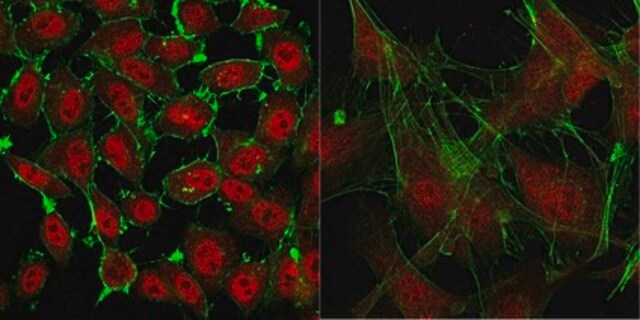SAB5500001
Anti-beta-Actin antibody, Rabbit monoclonal
clone SP124, recombinant, expressed in proprietary host, affinity isolated antibody
About This Item
Polecane produkty
pochodzenie biologiczne
rabbit
Poziom jakości
rekombinowane
expressed in proprietary host
białko sprzężone
unconjugated
forma przeciwciała
affinity isolated antibody
rodzaj przeciwciała
primary antibodies
klon
SP124, monoclonal
reaktywność gatunkowa
human (tested)
reaktywność gatunkowa (przewidywana na podstawie homologii)
chicken, mouse, rat, bovine, rabbit, pig, dog, hamster, frog
metody
flow cytometry: 1:100
immunoblotting: 1:200
immunohistochemistry: 1:200
izotyp
IgG
numer dostępu UniProt
Warunki transportu
wet ice
temp. przechowywania
2-8°C
docelowa modyfikacja potranslacyjna
unmodified
informacje o genach
human ... ACTB(60)
Powiązane kategorie
Opis ogólny
Immunogen
Zastosowanie
Działania biochem./fizjol.
Cechy i korzyści
Postać fizyczna
Oświadczenie o zrzeczeniu się odpowiedzialności
Not finding the right product?
Try our Narzędzie selektora produktów.
Kod klasy składowania
12 - Non Combustible Liquids
Klasa zagrożenia wodnego (WGK)
WGK 2
Temperatura zapłonu (°F)
Not applicable
Temperatura zapłonu (°C)
Not applicable
Certyfikaty analizy (CoA)
Poszukaj Certyfikaty analizy (CoA), wpisując numer partii/serii produktów. Numery serii i partii można znaleźć na etykiecie produktu po słowach „seria” lub „partia”.
Masz już ten produkt?
Dokumenty związane z niedawno zakupionymi produktami zostały zamieszczone w Bibliotece dokumentów.
Klienci oglądali również te produkty
Nasz zespół naukowców ma doświadczenie we wszystkich obszarach badań, w tym w naukach przyrodniczych, materiałoznawstwie, syntezie chemicznej, chromatografii, analityce i wielu innych dziedzinach.
Skontaktuj się z zespołem ds. pomocy technicznej












